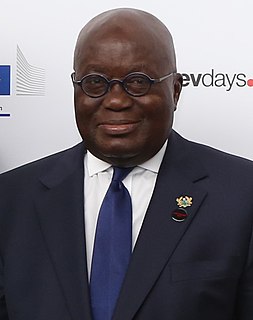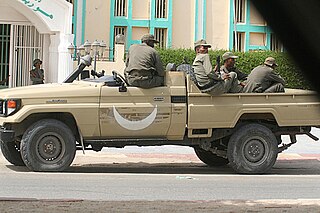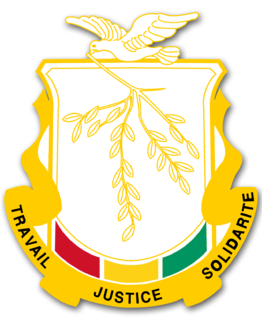
The President of the Republic of Ghana is the elected head of state and head of government of Ghana, as well as Commander-in-Chief of the Ghana Armed Forces. The current President of Ghana is Nana Akufo-Addo, who won the 2016 presidential election against the incumbent, John Dramani Mahama, by a margin of 9.45%. Nana Akufo-Addo was sworn into office on 7 January 2017.

John Evans Fiifi Atta Mills was a Ghanaian politician and legal scholar who served as President of Ghana from 2009 to 2012. He was inaugurated on 7 January 2009, having defeated the ruling party candidate Nana Akufo-Addo in the 2008 election. Previously he was Vice-President from 1997 to 2001 under President Jerry Rawlings, and he stood unsuccessfully in the 2000 and 2004 presidential elections as the candidate of the National Democratic Congress (NDC). He is the first Ghanaian head of state to die in office.
Brigadier Joseph Nunoo-Mensah is a Ghanaian soldier and politician. He is a former Chief of Defence Staff of the Ghana Armed Forces. He was also a member of the Provisional National Defence Council government which overthrew the government of Dr. Hilla Limann in 1981.

Mahamudu Bawumia is a Ghanaian economist and banker and the current Vice President of Ghana. He assumed office on 7 January 2017. His close friend is Paa Kwesi Appau

Golden Jubilee House, or Jubilee House, is the presidential palace in Accra that serves as a residence and office to the President of Ghana. Jubilee House is built on the site of a building that was constructed and used for administrative purposes by the British Gold Coast Government. The previous seat of government of Ghana is Osu Castle. It was renamed Golden Jubilee House by President Nana Addo Danquah Akuffo Addo on 29th March 2018. It has previously been known as The Flagstaff House.
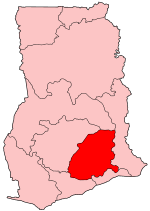
The Akim Abuakwa South constituency is in the Eastern region of Ghana. The current member of Parliament for the constituency is Samuel Atta Akyea. He was elected on the ticket of the New Patriotic Party (NPP) and won a majority, with 5,046 votes more than candidate closest in the race, to win the constituency election to become the MP. He succeeded Nana Addo Dankwa Akufo-Addo who had represented the constituency in the 4th Republic parliament on the ticket of the New Patriotic Party (NPP). .
The 2011 New Patriotic Party constituency primaries was a nationwide election organised by the Electoral Commission of Ghana at the request of the New Patriotic Party for the election of candidates that would represent the party in the 2012 parliamentary elections. The New Patriotic Party is the biggest opposition party in the Parliament of Ghana with 107 members of parliament out of 230. Nominations for the primaries opened on 28 February and closed on 6 March 2011. 73 constituencies had their current members of parliament standing unopposed. At such places, the members were elected by acclamation. A total of 516 persons contested the 220 constituency seats.
The 2010 New Patriotic Party presidential primary election was a nationwide election organized by the Electoral Commission of Ghana at the request of the New Patriotic Party of Ghana for the election of a candidate that would represent the party in the 2012 presidential and parliamentary elections. It was held on 7 August 2010. The New Patriotic Party is the biggest opposition party in the Parliament of Ghana with 107 members of parliament out of 230.

General elections were held in Ghana on Friday 7 December 2012 to elect a president and members of Parliament in 275 electoral constituencies. Owing to the breakdown of some biometric verification machines, some voters could not vote, and voting was extended to Saturday 8 December 2012. A run-off was scheduled for 28 December 2012 if no presidential candidate received an absolute majority of 50% plus one vote. Competing for presidency were incumbent president John Dramani Mahama of the National Democratic Congress (NDC), his main challenger Nana Akufo-Addo of the New Patriotic Party (NPP) and six other candidates.
2011 in Ghana details events of note that happened in Ghana in the year 2011.

The National Democratic Party (NDP) is a Ghanaian political party, founded in October 2012 as a split from the ruling National Democratic Congress. Its first leader was former NDC politician Nana Konadu Agyeman Rawlings, who is also the wife of former President of Ghana and NDC founder Jerry Rawlings.
Joe Ghartey is a Ghanaian lawyer, academic and politician. He is the current Railways and Development minister. He was appointed by President Nana Akuffo Addo on 11 January 2017. Joe Ghartey hails from Shama, in the Western Region of the Republic of Ghana.
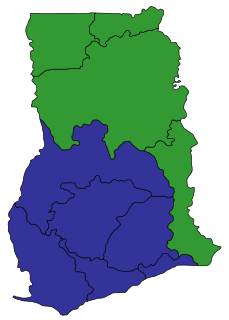
General elections were held in Ghana on 7 December 2016 to elect a President and Members of Parliament. They had originally been scheduled for 7 November 2016, but the date was later rejected by Parliament. Former foreign minister Nana Akufo-Addo of the opposition New Patriotic Party was elected President on his third attempt, defeating incumbent President John Mahama of the National Democratic Congress.
Anthony N-Yoh Puowele Karbo is a Ghanaian politician and member of Parliament. He is a member of the New Patriotic Party and the deputy minister for Roads and Highways in Ghana.
Joseph Anokye is a Ghanaian geodetic engineer and technology manager. He has worked with various international organizations, including the National Aeronautics and Space Administration in the United States as a telecommunications service manager. He is a member of the New Patriotic Party and the current head of the National Communications Authority of Ghana.



